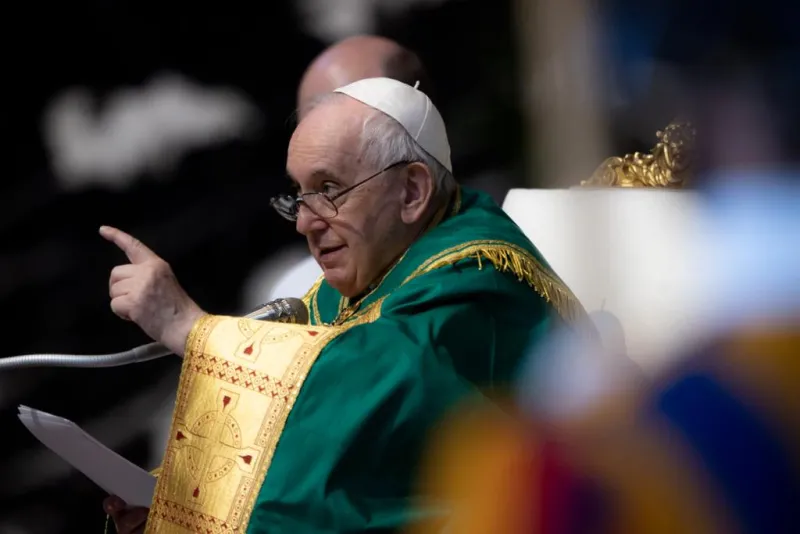
Vatican City, Jul 18, 2022 / 03:56 am (CNA).
Pope Francis has called on Catholics to counter toxicity in social media, and to engage in dialogue and education to help deal with “lies and misinformation”.
In a message published by the Holy See on July 18, the Holy Father also called for the inclusion of currently excluded communities into “the digital space”.
Pope Francis addressed this message to the participants of the 2022 World Congress of SIGNIS in Seoul, South Korea. The event is held every four years, and the 2022 Congress explores the theme of “Peace in the Digital World” both on site and digitally from August 16-19.
SIGNIS is the World Catholic Association for Communication, an organization whose mission is to “help transform cultures in the light of the Gospel by promoting human dignity, justice and reconciliation.”
In his message, Pope Francis said, “the use of digital media, especially social media, has raised a number of serious ethical issues that call for wise and discerning judgment on the part of communicators and all those concerned with the authenticity and quality of human relationships.”
“Sometimes and in some places, media sites have become places of toxicity, hate speech and fake news,” the pope added.
He encouraged Catholic communicators to persevere in efforts to counter these, “paying particular attention to the need to assist people, especially young people, to develop a sound critical sense, learning to distinguish truth from falsehood, right from wrong, good from evil, and to appreciate the importance of working for justice, social concord, and respect for our common home.”
The pope also drew attention to “the many communities in our world that remain excluded from the digital space, making digital inclusion a priority.”
In doing so, Catholic communicators provide a “significant contribution to the spread of a culture of peace grounded in the truth of the Gospel,” the Holy Father added.
Pope Francis prayed that “the story of Saint Andrew Kim and his companions two hundred years ago [may] confirm you in your own efforts to spread the Gospel of Jesus Christ in the language of contemporary communications media.”
If you value the news and views Catholic World Report provides, please consider donating to support our efforts. Your contribution will help us continue to make CWR available to all readers worldwide for free, without a subscription. Thank you for your generosity!
Click here for more information on donating to CWR. Click here to sign up for our newsletter.





Promoting human dignity, justice, and reconciliation are vital engagements for an ethically healthy world-building.
According to CLIMATE IMPACT PARTNERS website at this time, the global carbon footprint for internet and its tech, is 3.7%, which is the equivalent measure for the entire airline industry. It is expected that by 2025 this number for internet footprint will have doubled. The article makes no mention of blockchain or similar crypto-ledger mechanisms, nor Web3, within the various components it identifies for its footprint computation. I suspect that separate measures would have to be added on for them, to get the full picture.
According to DOWN TO EARTH and UNFCCC, blockchain electricity consumption ranks with that for New Zealand and/or Argentina. If you read some of the wider literature on the internet the question arises how much of that electricity is coal-powered. As always, the information being collated is based on known activities and producers. Blockchain has the potential to be fueled “off-grid” and even produced privately; what this is eventually going to mean for emissions and legality, is a huge area.
With the arrival of new technologies like Web3 etc., the rate of usage is bound to increase by exponents and so the 2025 carbon footprint estimate is likely very low.
https://www.climateimpact.com/news-insights/insights/infographic-carbon-footprint-internet/
https://www.downtoearth.org.in/blog/environment/as-cryptocurrency-becomes-mainstream-its-carbon-footprint-can-t-be-ignored-81118
https://unfccc.int/blog/the-good-the-bad-and-the-blockchain
The amount of energy needed to replace the work done by people with robots and robotics, will at some point not be “sustainable”. I am not suggesting it is moral and I am not in favour of replacing people. Can you possibly conceive the level of artificiality that will reign in robot-based economics!
‘ Considering heavy reliance on robotics to achieve business objectives, there would be a time when robots are required to develop and maintain economic relationships. …..
With advanced encryption techniques such as cryptographic digital signatures and cryptographically secure public-key cryptography that form an integral part of the blockchain, the users can stay assured of the optimum security for data across shared channels. The information shared is highly secured for the fact that its accessibility is controlled by the specific private key available to a robot.
With blockchain technology in place, a pair of public and private keys can be assigned to each robot in the group, considering the case of swarm robots. Here, the public key can be the foremost information available about a robot whereas the private key can identify a robot before initiating the communication. …..
Possibly, one of the best solutions to employ would be to opt for a market mechanism, leveraging game theory, decision theory, and economic mechanisms to assign work. ‘
https://www.analyticsinsight.net/the-impact-of-blockchain-technology-on-robotics/
There is public crypto/blockchain and private. Private would be more “dependable” in the sense that the parties involved would tend to be in direct contact with one another and the systems are purposed to their arrangements. But even so, these things can “go dark” just as with the corollary “public bureaux” frameworks. Some articles explaining the new things, are here -:
https://brave.com/web3/intro-to-blockchain/
https://brave.com/web3/built-on-web3/
https://brave.com/web3/what-are-web3-browsers/